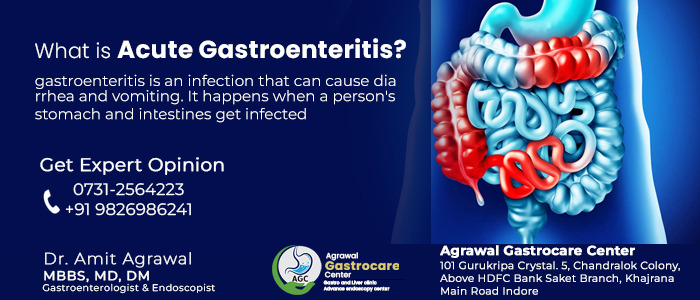
What is Acute Gastroenteritis?, Symptoms, Cause, Treatment, Diagnosis
Acute Gastroenteritis is also known as Infectious Diarrhea. It is a common infectious disease syndrome, which is a combination of nausea, vomiting, diarrhea, and abdominal pain.
Gastroenteritis causes swelling in the stomach, small intestine, or large intestine. Acute Gastroenteritis usually lasts less than 14 days, but if the patient is suffering from chronic gastroenteritis, then it may last more than 30 days.
The main cause of gastroenteritis is dehydration which can be prevented if the fluid is lost in vomit and diarrhea is replaced.
A person suffering from severe gastroenteritis may need fluids that are directly injected into the bloodstream via a vein.
Symptoms of Acute Gastroenteritis
The symptoms of Acute Gastroenteritis are:
- Loss of appetite
- Nausea
- Vomiting
- Abdominal pain
- Diarrhea
Cause of Acute Gastroenteritis
Some of the causes of gastroenteritis include
- Viruses
- Bacteria
- Drugs
- Medications
- bacterial toxins
- Unwashed hands after going to the washroom
- Contaminated food or water

Diagnosis of Acute Gastroenteritis
Some of the diagnostic methods may include:
- Patient’s medical history
- Physical examination of the patient
- Patient’s blood tests
- Stool tests.
Treatment of Acute gastroenteritis
As different types of gastroenteritis respond to different treatments. Here are some of the treatments which may help you.
- Intake of plenty of fluids like water and broth. A person should prevent dehydration and drink fluids as much as possible.
- A person should drink fluids slowly in frequent, small amounts because drinking too much too fast can cause nausea worse.
- A person should not have drinks that contain milk, caffeine, or alcohol.
- If you are feeling hungry start with simple and mild, which is easy to digest.
- Rehydrate children with oral rehydration solutions.
- You may take antidiarrheal medicines for a couple of days. But in case you have a fever and you are passing bloody stool or you are an elderly adult then you should not consume these medicines.
- The main focus of the treatment is to prevent dehydration because one of the ultimate causes of gastroenteritis is Dehydration. But in severe cases, hospitalization and intravenous liquids may be necessary.
- Usually, doctors don’t prescribe antibiotics to treat viral gastroenteritis. Antibiotics don’t work for viral infections.



